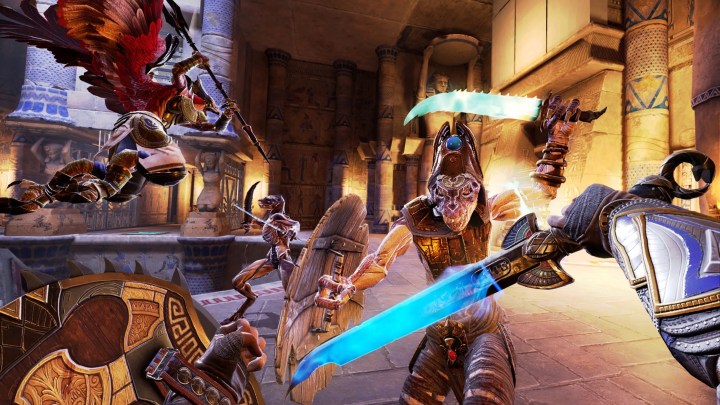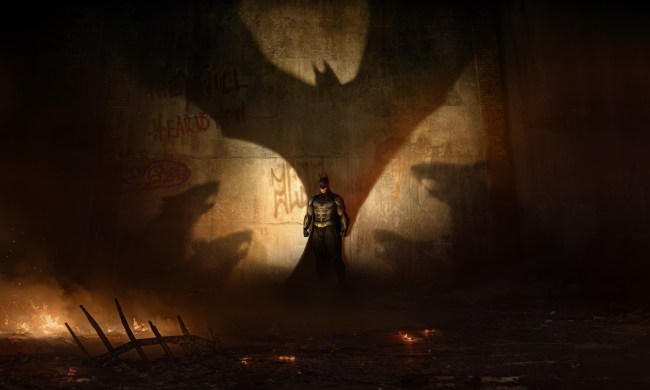
Gamers woke up to some very surprising news on Wednesday, May 1. Game Awards creator Geoff Keighley revealed via X that Rocksteady’s beloved Batman: Arkham series was making a comeback. Batman: Arkham Shadow would launch later this year, with more details coming in June during Summer Game Fest. It was a cause for celebration … until people read the fine print.
Batman: Arkham Shadow is a Meta Quest 3 exclusive.
That detail was not received kindly. Replies to Keighley’s tweet are filled with players bemoaning the VR exclusivity. “Got all excited until I saw VR,” one reply reads. Some complaints are more specific, with players angry about its platform exclusivity. There are fair critiques to be made, but I for one am excited about Batman: Arkham Shadow — and anyone paying attention to VR over the past few years should be too.
Embracing VR
At first glance, I can sympathize with those who find Batman: Arkham Shadow disappointing. For one, it’s coming to one specific platform that’s not nearly as widely adopted as the PlayStation 5 or Xbox Series X. The fact that it won’t even be available on PlayStation VR2 is an annoyance for anyone who invested in Sony’s poorly supported headset last year. It’s also disappointing that the game isn’t being developed by Rocksteady, the studio that built the Arkham games in the first place.
Once you get past those annoyances, though, the news goes down much smoother. The most exciting piece of this is the developer behind it. The project is coming from Camouflaj, a VR studio that Meta acquired in 2022. The studio is responsible for 2020’s Iron Man VR — and that should perk your ears up. While I’ve previously voiced my fair share of issues with Iron Man VR, the project was crucial to changing the tech’s reputation in 2020. At that point, developers were still struggling to create full-featured games that could be played on a headset. Iron Man VR was ambitious for the time, delivering a meaty eight-hour adventure with lots of systems to toy around with. If Camouflaj could do that four years ago, and without the big-budget backing of Meta, imagine what it could do now.

Iron Man VR has one thing going for it in particular that has me excited about Camouflaj’s move to Arkham: It contains the most inventive control scheme I’ve ever experienced in VR. Taking full advantage of one-handed controllers (the former PSVR exclusive was built with the Move controllers in mind), players tilt their controllers to soar like Iron Man. The control scheme is built to mirror Tony Stark’s palm thrusters, meaning that players need to point them correctly to slow their speed, turn, and more. It’s all incredibly immersive once you get the hang of it.
If Camouflaj can bring that same energy to Batman: Arkham Shadow, players are in for a treat. Imagine gliding through Gotham, holding the Quest 3’s controllers out to turn the cape. Simple actions like throwing a Batarang or firing a grappling hook could shine in VR with the right control scheme. I trust Camouflaj to get that job done.
For some, a capable developer still might not be enough to get them on board with Arkham Shadow. There’s still a lingering stigma around VR games that comes both from valid concerns and outdated views of the tech. The more understandable critique is that not every player wants to wear a big helmet on their face. My Quest 3 hurts to wear after a while, so I empathize with that point especially. I hate playing long games on the platform as I can almost never finish anything longer than 10 hours in a reasonable time due to frequent breaks.
What’s less up to date is the perception as VR gaming as a lesser experience than console and PC. While the tech does still have its limitations, critiques like this are stuck in the past. VR’s development has progressed quickly in the last 10 years. The games released four years ago look miniscule compared to what’s coming out today. Long gone are the days where short “experiences” dominated the platform. You’ve now got strong, fully formed games like Horizon Call of the Mountain and Assassin’s Creed Nexus VR gracing headsets. In 2023, we even saw that a VR game could compete in Game of the Year discussions thanks to the incredibly well-reviewed Asgard’s Wrath 2.

Batman: Arkham Shadow is likely to be much closer to those games than some may assume. Considering the depth of content in Iron Man VR, Arkham Shadow has the potential to be a full-on adventure rather than a small novelty like 2016’s hourlong Batman: Arkham VR. We’ve come a very, very long way since then and I imagine Arkham Shadow will emphasize that this year.
Rather than writing a game like this off so quickly, it’s worth celebrating the fact that VR is getting more serious experiences like this. Some may be mad because they don’t own a Meta Quest 3, but games like this are exactly what companies need to deliver to sell their platforms. Even if it Arkham Shadow doesn’t end up being as revolutionary as Rocksteady’s Batman games, it could give players a great reason to pick up a headset. Sometimes it’s more fun to play games than it is to be cynical about them from a distance.



